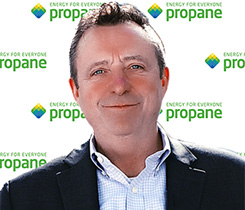Making a splash
For most of the nation’s propane retailers, summer is a slow period, a time to regroup after one busy winter heating season and plan for the next. Some retailers – particularly those in the South – stay busy selling fuel for heating swimming pools.
But more retailers might find themselves selling propane to heat swimming pools rather than relaxing beside one themselves as the industry begins to dip its toe into the waters with a propane-fired heat pump pool heater, which – if it works – could be more than twice as efficient as propane pool heaters currently on the market.
 Total Pool Sales and Annual Heater Sales |
These units also would be priced competitively but cost hundreds of dollars less to operate than the electric heat pump models that have surged in popularity in recent years.
A prototype under development in Ohio that has generated interest – and a $250,000 grant – from the Propane Education & Research Council could hold the key to unlocking the grip electric heat pumps have begun to establish over propane pool heaters. Furthermore, if this propane heat pump technology proves successful, developers and PERC officials hope it would translate into other applications, such as space heating and cooling for homes and recreational vehicles.
“We’re hoping the propane industry will see the value of the pool heater and will want to go forward with us for a heat pump,” said Fred Solomon, the inventor.
The technology is being developed in an unassuming workshop outside of Akron, Ohio, by a small group called ThermoDrive. It uses a closed-loop design to re-circulate heat exchange fluid, which vaporizes into a high-pressure vapor that drives a slow-cycling industrial ceramic piston. The vapor is condensed into a liquid then returned to the heat generator. Heat from the heat pump heating cycle and recuperated heat are used to supplement the propane fuel source, which accounts for a coefficient of performance (COP) operating efficiency near 2.0.
 Pool Heating Costs |
The propane heat pump runs much more quietly than its electric cousin, a quality-of-life feature important to the mostly upper-income residents lounging poolside.
“One typically locates the pool heater fairly close to the pool itself. It’s like having the air conditioning compressor right next to the pool. It’s fairly noisy,” says Jim Berry, ThermoDrive’s general manager, said of the electric unit. “Ours will not have that disadvantage. You can put it right next to the pool and not even hear it running.”
The 5-ton propane unit was designed to look similar in size and interior design to the electric heat pump so as to not scare off technicians and to reduce the need for maintenance training. The prototype is even housed inside the case of a former electric heat pump.
Valves made of industrial ceramic – said to be second only to diamonds in hardness – may ensure at least 15 to 20 years of operation without wear. It’s not an internal combustion engine, so there is no oil to change or spark plugs to replace, and no parts to oil like with an electric heat pump.
 Inventor Fred Solomon, owner of 15 patents and inventor of the first drive-through, automatic car wash using natural gas, says the technology for his propane heat pump could have even broader potential. |
“It’s really maintenance free,” said Solomon, a retired chief mechanical engineer who owns 15 patents for a variety of inventions. His biggest claim to fame – thus far – might be designing the first drive-through, automatic car wash, which used natural gas. However, he said, the technology that drives the propane heat pump might be even more significant for its broad potential.
Existing propane pool heaters are forced-draft combustion systems built for either propane or natural gas. Although highly efficient equipment is available (at twice the initial cost) with efficiencies as high as 95 percent, standard units run about 80 to 82 percent efficient.
Compare that with electric heat pumps, which boast COP figures of 5 and 6, and propane hardly holds a candle. Yet those figures, like others touted by electrical appliances, are the subject of a 30-year debate, notes Tony Occhionero, a consultant with ThermoDrive and a longtime gas industry specialist. After figuring the amount of energy lost between the electrical plant and the pool at which it is used, Occhionero argues the number is more like 1.8 or 1.9.
“Even though you have an electric unit that looks more efficient, I can show you that a propane unit will be just as efficient or more,” he says.
Cost to operate
ThermoDrive estimates that the initial cost for the propane pool heater might run 10 to 15 percent higher than an electric version. Where the rubber meets the road for many homeowners, though, will be how much it costs to run.
Occhionero’s report (based on propane at $1.15 per gallon) shows that a homeowner in New York, heating a pool for five months, would spend $1,560 with an electric heat pump, $2,991 with a traditional propane unit, $3,060 for one that works on natural gas – but just $1,196 with the ThermoDrive heat pump. Similar savings were projected in other U.S. cities.
Propane pool heaters account for just 3 percent of the market, or annual sales of 12,600 units. Natural gas units dominate the market with 66 percent and annual sales of about 278,200 units. Electric heat pumps – virtually unheard of a decade ago – have stolen 27 percent of the market, largely in areas where natural gas lines do not exist and propane would be the obvious alternative.
“Propane heater manufacturers need to improve the overall efficiency of their unit if they’re going to compete with the electric heat pump,” Occhionero says.
“One of the difficulties we encountered was that many folks in the propane industry say I’m selling ‘X’ number of units today and making some money, why should I care? The numbers show that, unless you do, your growth will be limited to replacements. But if you can improve performance, you stand a good chance of capturing new markets. That, to me, is the key.”
Americans boast about 7.4 million backyard and resort pools, and some 4.2 million of them have heaters, according to the report. Another 170,700 in-ground and 196,000 above-ground pools were purchased in 2000, the most recent year for which data was available. Some 243,100 of those new pools likely had heaters, the report states.
Occhionero estimates the company could initially sell 5,000 to 10,000 units, reaching sales of up to 37,400 units per year if it expands into a variety of sizes.
All of that optimism sounds good, but Independent Propane President Robert Blackwell is holding on to his heart. As chairman of the Gas Cooling subcommittee of PERC’s Research & Development Advisory Committee, he has studied the ThermoDrive proposal, and is cautiously optimistic.
“The good thing about the project is it would give us the technology that would give us something better than the 95 percent efficiency that we can get out of the presently designed furnace. That’s twice as good as a condensing furnace, and that means the fuel could be sold to a higher-premium use,” Blackwell said. “We’re trying to get a better value out of our fuel to whomever you sell it to. It would be easier for our customers to pay their bills.”
After changing his mind four times about whether to recommend that the council approve the grant, Blackwell says, he decided to back it after thermodynamics experts said the technology appeared sound.
“It’s a pretty far reach in technology to have two refrigerant loops in a device in a little plant like that and have neither one of them leak, or leak into each other,” he says.
He remains hopeful, but unconvinced.
“Could it (work)? Certainly, it could. Probably, it’s a toss-up. That’s opinion and impression; that borders nowhere on fact,” he says. “I was one of the more skeptical ones, but when I saw the performance numbers, I said, ‘Wow, is that possible? Why isn’t someone doing it now?'”
“We wouldn’t fund it if we didn’t think they would be successful. As a newer technology, it’s not perfected so there’s definitely a risk. But there’s risk in all research and development,” explains Greg Kerr, PERC’s director of research and development.
“There’s definitely excitement about this project.”
What’s ahead?
While the propane industry is anxious to see the pool heater’s success, it is even more interested in seeing its potential develop into the heating and cooling areas.
“We can do a furnace – propane-fired or natural gas-fired – and it would be essentially twice as efficient as any other gas-fired furnace out there,” boasts Berry, ThermoDrive’s general manager.
“The payback on that would be very reasonable from a consumer standpoint. The Department of Energy likes it because it would have half the gas emissions. Cut all of the combustion gases in half; that’s a big deal from a national standpoint. That will undoubtedly be our next product after we complete the pool heater project up there. We will go directly into the furnace market. That’s a 100-million-unit market out there in this country. That would also be a natural for the propane industry.”
Other potential applications include space heating for recreational vehicles, which consume significant volumes of propane for cooking, and for marine use. ThermoDrive, which already has invested $2 million in the project, says it has eight or nine projects in mind.
But first things first: the pool heater must clear independent testing at Cleveland State University to determine the final design before deals are finalized with a manufacturer and units are field tested to work out all the bugs before entering the market, possibly as early as 2005.
“We’re all eager to see the results,” Blackwell says.
Florida retailers anticipate more efficient propane pool heater.
Propane might occupy only a 3 percent hold among other fuels used to heat pools nationally, but retailers in Florida indicate they have a much stronger position.
With fewer natural gas lines running through what remains a largely rural state, many homes, businesses and resorts rely on propane or electricity for pool heating, water heating, fireplaces and outdoor grills.
While definite numbers are fairly hard to come by, propane is the main fuel used for pool and spa heating in Florida, according to G. David Rogers, executive vice president of the Florida Propane Gas Association.
In the state’s northern tier, many homes turn to spas rather than pools because cooler temperatures shorten the season. David McPhillips, president of Hillsboro Gas in Tampa, says 80 to 90 percent of the company’s 35 new customers each month are for spa heating. In addition, he says, the company performs about 15 builder installations each month, and he estimates 80 percent of those have spas.
Most customers are willing to buy the more expensive high-efficiency heaters over the cheaper standard-efficiency models to save money in the long run in operational costs, McPhillips says. A propane-fired heat pump pool heater with double the efficiency of those high-efficiency heaters currently available would be of interest to his customers, he predicts.
“They’re stepping up, spending the extra bucks and buying the more efficient propane ones now. So if a heat pump model came out and there was a cost savings, I think the consumer would definitely move to it,” he says.
The average customer around Tampa uses about 130 gallons of propane each year to heat their spas, McPhillips says. Customers would blow through 1,500 gallons of propane a year trying to heat their pool year-round, he explains.
Meanwhile, in the state’s southern tier, McPhillips estimates customers would use about 300 to 400 gallons of propane to heat their pools.
Tom Ross, a Sarasota-based regional manager for Suburban Propane, says pool and spa heating is a big target market for his company. Many all-electric homes select propane for their pool heaters because they also want propane for their fireplaces and outdoor grills, he notes.
“Pool and spa heating for us makes up a big portion of our new installations,” Ross says. “If they go with the propane pool heater, they have the opportunity to go (with it for) other lifestyle items.”
While the propane heat pump pool heater sounds like a good idea, McPhillips notes that propane burners trounce heat pumps in their ability to heat water quickly — a feature of particular importance to spa owners, who want to turn on the heater and enjoy their spa within 15 minutes. That would continue to be an issue with a propane heat pump, which would take about an hour to heat a spa.
“A heat pump works best for the person who wants to keep the pool warm all the time,” he says.
But, he sees the merits of the industry helping to develop the propane heat pump for other applications.
“If they can make it work for the pool heater, then they can make it work for space heating,” McPhillips says. “That’s really what we’re interested in.”
Rogers says the propane heat pump would be a welcome competitor for the electric version — especially if one day it can also provide air conditioning. “We’ll keep our fingers crossed and hope that it happens,” Rogers says.
















